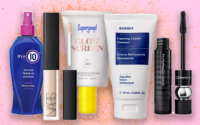The shocking amount of time people spend on their looks every day
That’s a lot of time to makeup.
People spend one-sixth of their lifetime trying to enhance their physical appearance, according to research recently published in the journal Evolution and Human Behavior.
Survey data from 93,158 participants across 93 countries and various cultures was analyzed to discover universal beauty trends.
The international research team considered makeup and cosmetics application, hair grooming, clothing style, body hygiene, exercise and dietary habits as actions taken to better one’s looks.
Nearly all survey participants admitted to spending at least 10 minutes improving their appearance each day, but most routines lasted a lot longer.

Women spend an average of four hours a day and men spend an average of 3.6 hours a day primping in some way, the November study found.
“Furthermore, we found that more time improving one’s appearance was spent by individuals who considered themselves as more (vs. less) attractive, less (vs. more) educated, individuals with higher (vs. lower) socioeconomic status, and individuals with more right-wing (vs. left-wing) political views,” the researchers wrote.
“There was no relationship between time spent improving one’s attractiveness and the countries’ gross domestic product per capita.”
Younger people, daters, and those with weaker immune systems were also more likely to be more concerned about their looks. The latter group supports the “pathogen prevalence” theory that suggests people suffering from an illness may spend more time working on their appearance to hide signs of poor health.
But researchers found the strongest predictor of beauty-enhancing behaviors is a person’s social media usage. TV viewership was also a factor.
“Watching TV was more strongly related to physical attractiveness enhancing behaviors among women than men, while social media usage explained more variance in these behaviors among men than women,” the study noted.
Another recent study found that social media use spurred people to think poorly about their bodies.
Halving the time spent on social media “significantly” improved some teenagers’ body images within weeks, according to a study from the Children’s Hospital of Eastern Ontario Research Institute.
Unsurprisingly, the research showed avoiding the constant barrage of air-brushed influencers and gorgeous models helped teens feel better about their own weight and looks after just three weeks.


